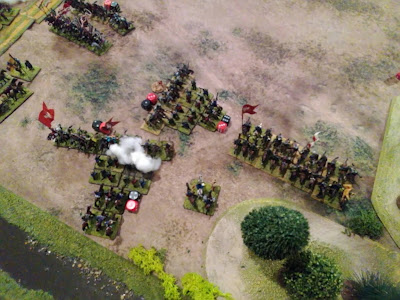The idea for that game came during our last By Fire and Sword game. To play it with similar troops, but with Pike and Shotte rules. Before that, I little changed the Polish-Lithuanian and Swedish statistics from the book. I have upgraded the Cossack Style Cavalry to non-skirmishers, add winged hussars lance (it has -2/-4 saves on morale and gives the charge bonus against pike blocks). I also made all lances/spears as single-use weapons.
Pomysł na tą grę powstał podczas naszej ostatniej gry z użyciem zasad Ogniem i Mieczem. Chodził o to , by tymi oddziałami zagrać z zasadami Pike and Shotte. Zanim jednak do tego doszło lekko zmieniłem statystyki dla Rzeczpospolitej i Szwedów. Jazdę kozacką zrobiłem normalną kawalerią i dodałem lancę husarską (ma -2/-4 do obrony przeciw uderzeniom i daje bonus szarży przeciw blokowi pikinierskiemu). Równocześnie wszystkie lance/rohatyny zrobiłem broniami jednorazowymi.
UMPIRING / PROWADZENIE GRY: Bartek Żynda
1. Forces. Siły.
2. The game. Gra.
Still is the spring of 1656. After the first battle, Polish troops retreated across the river and the Swedes troops followed the escapees. Commonwealth units get reorganised (they even received the pay!) and were able to fight. Their morale was raised by information about the possible reinforcements. The only concern was about what side those units will be on. To which king they are loyal, the Charles or John Casimir. No one knows the answer to that question.
Wciąż jest wiosna 1656 roku. Po pierwszej bitwie, polskie oddziały wycofały się za rzekę a Szwedzi podążyli za uciekinierami. Oddziały Rzeczpospolitej przeorganizowały się (otrzymały nawet wypłatę żołdu!) I były zdolne do ponownej walki. Ich morale zostało podniesione informacjami o nadciągających posiłkach. Jedynym problemem było to, któremu królowi były one lojalne. Czy Karolowi, czy też Janowi Kazimierzowi. Odpowiedzi na to pytanie nie znał nikt.
It started with a left flank Swedish cavalry charge, which was easily repulsed by Polish cavalry. That caused a little panic in Swedish lines. Their commander calls the right flank cavalry to support the left flank. However, a new threat appeared. Another Polish cavalry regiment loyal to King John Casimir.
Zaczęło się od szarży szwedzkiej kawalerii na lewej flance. Ta została z łatwością odparta przez polską kawalerię. To spowodowało panikę w szeregach szwedzkich i ich dowódca wezwał kawalerię prawego skrzydła by wsparła lewe skrzydło. Jednakże pojawiło się nowe zagrożenie. Nadjechał pułk polskiej jazdy, lojalny królowi Janowi Kazimierzowi.
That forced the Swedish commander to call off his previous order and protect his right flank. In the meantime, Poles started to prepare for the main attack, by shuffling their units. Then a new cavalry regiment arrived, another loyal to King John Casimir. Swedes were doomed at this point but decided to stand fast as long as they could.
To wymusiło na szwedzkim dowódcy odwołanie wcześniejszych rozkazów i ochrony prawej flanki. W międzyczasie Polacy przygotowywali główny atak, przetasowując swoje oddziały. Wtedy przybył kolejny pułk jazdy lojalny Janowi Kazimierzowi. Szwedzi byli w tym momencie zgubieni, ale postanowili tanio swej skóry nie sprzedawać.
Then the Polish troops charged. On their left light cavalry was temporarily stopped by Swedish Reiters. In the centre, Polish cavalry decimated the Swedish dragoons. Brave Musketeers had to cover behind their pikemen and in that way, they survived the Winged Hussar charge. However, Swedish resistance decreased and eventually, they had to give up. The battle ended with the victory of the Commonwealth.
Wtedy nastąpiła szarża sił polskich. Na ich lewej flance dzielny opór tymczasowo stawiała szwedzka rajtaria. W centrum, polska kawaleria masakrowała szwedzkich dragonów. Dzielni muszkieterzy musieli wycofać się za osłonę własnych pikinierów, ale w ten sposób przeżyli szarżę husarii. Jednakże, z czasem opór szwedzki malał i w końcu musieli się oni poddać. Bitwa zakończyła się zwycięstwem sił Rzeczpospolitej.

















































Great battle report. I'm still trying to work out what the battle's called and how to say it?
OdpowiedzUsuńThank you. Don't worry, it is just simple Polish name for village, we have many like that. ;)
UsuńGreat looking game, Bartek! One of the gamers here has the rules and has hosted I few games before. I've yet to try it out myself, but the games looked good.
OdpowiedzUsuńI comoare both rules and from hostorical point of view and for its realism, I would choose By Fire and Sword, but for the game over the internet or club evening, pike and shotte, as it is simpler and quicker.
UsuńFantastyczna bitwa Bart! Fajnie wygląda na innych zasadach, no i nazwa! :)
OdpowiedzUsuńNazwa musi być! ;)
UsuńA wonderful game, Bartek! What rules did you like best?
OdpowiedzUsuńThank you. For bigger game and historical realism, I would choose By Fire and Sword, for the quick club game Pike and Shotte.
UsuńGreat looking game Bartek and your step-wise photos tell the story marvellously. It's really interesting to see the cavalry-dominant Polish-Lithuanians come up against a Swedish force with far more infantry, a close tussle for many turns and then they slowly got the ascendency and broke through almost everywhere. Beaut stuff!
OdpowiedzUsuńRegards, James
Thank you. Yes, indeed. However the Swedish player made a big mistake, firstly he moved back all of his troops and gave space to incoming Polish troops and secondly he panicked when his entire left cavalry flank evaporated as a result of the Polish charge. Anyway, quite an interesting experience.
Usuń